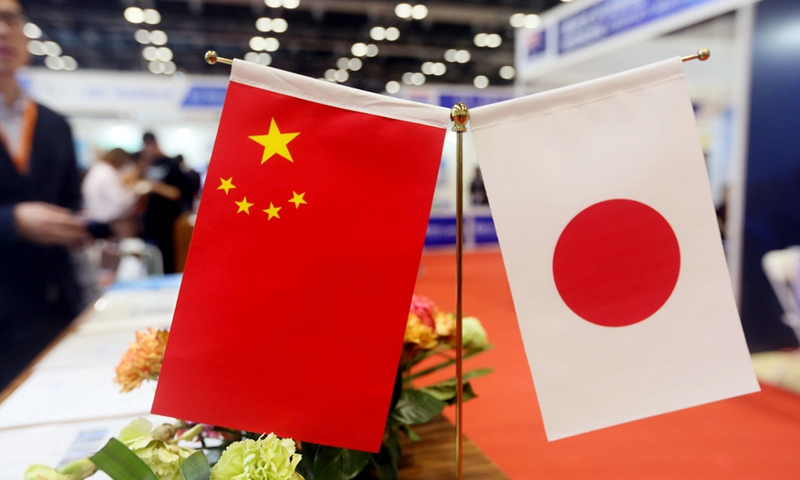
China Japan Photo: IC
Japanese parliament on Wednesday passed an economic security bill. The legislation, which will be implemented in stages from 2023, is "primarily aimed at warding off risks from China," according to the Japan Times.
Since he took office last year, Japanese Prime Minister Fumio Kishida has identified economic security as one of his policy priorities. To ensure effective implementation of the policy focus, Tokyo has taken measures, including creating the post of economic security minister, holding expert seminars, and promoting economic security legislation. The newly passed legislation is full of small calculations against China when read between the lines.
The newly passed economic security legislation covers four aspects for strengthening supply chains for important materials, ensuring infrastructure operation, promoting cooperation between authorities and the private sector in cutting-edge technology research and development, and protecting nonpublic specific patents.
First, the legislation will resort to administrative means to interfere in Japan's economic order. The economic security legislation enshrines Japanese government rights to monitor, investigate Japanese companies, and control imports and exports, adjust resource supplies. For example, in order to protect Japanese infrastructure from cyberattack, Japanese infrastructure companies are asked to submit applications to government and accept investigations before importing foreign equipment. If the Japanese government identifies the equipment provider as a "country with a security threat," it will order the company to stop the import process.
Second, the legislation focuses on cutting-edge technology fields. The law stipulates that the Japanese government should promote cooperation between the government, industry and academia in quantum, space, ocean, and artificial intelligence research by providing financial assistance, building consultation platforms, and sharing sensitive information. Since all these technologies involves military use, the country's defense, national security departments will participate in the consultation meeting on cutting-edge technology research and development.
Third, the bill reveals the implicit intention of uniting the US, Australia and other countries to exclude China. The law emphasizes that Japan will realize diversification of independent production and supply sources of important materials in order to "eliminate the potential risk of supply interruption due to excessive dependence on specific countries." In addition, the specific patent non-disclosure system covered by the law is also aimed at preventing the key technologies from entering China. Echoing Japan's economic security law, the 2022 edition of Japan's Diplomatic Bluebook lists economic security cooperation projects such as Japan-US, Japan-Australia, and Japan-Europe. This shows that Japan will deepen its economic ties with so-called "like-minded countries" in an attempt to build supply chains which exclude China.
For a long time, China and Japan have enjoyed highly complementary and close trade relationships. China has been Japan's largest trading partner for 15 consecutive years. Despite the impact of the COVID-19 pandemic, the total bilateral trade volume between China and Japan in 2021 remains at the high level of $371.4 billion. As the Regional Comprehensive Economic Partnership (RCEP) came into effect this year, bilateral economic relations between China and Japan are expected to reach a new level.
Historically, economic relations have played the role of "ballast" and "booster" in the relationship between the two countries. Recently, due to concerns that the economic security law may impact trade and investment cooperation between China and Japan, many people of insight into Japanese economics have called on the Japanese government to protect China-Japanese economic relations, emphasizing that China-Japanese relations are of great significance to Japan's own economic development, the prosperity of East Asia, and the world.
Japanese experts also referenced that the US and Japan experienced intense semiconductor competition from the 1980s to the 1990s. In the face of the leading development of Japan's semiconductor technology, the US once brutally suppressed Japan. It was also during this period that the semiconductor industries in China's Taiwan island and South Korea caught up, quickly weakening the competitiveness of Japanese companies.
Against the backdrop of the unprecedented changes in the world, it is understandable for all major economies to be concerned about the security of their respective economies. However, this concern should have its reasonable boundaries and should not contribute to the negative trend of pan-securitization over a swathe of economic issues, or even the weaponization of geopolitics.
When the Japanese government promotes implementation of the economic security law, it should maintain a certain degree of rationality and strategic autonomy, abandon the outdated concept of zero-sum game, and avoid blindly following the so-called decoupling campaign from China. Japan should not become a geopolitical tool for other countries.
In the long run, people from China and Japan, especially those in economic circles, should strengthen communication and dialogue, understand each other's concerns and core principles, safeguard the hard-won results of economic and trade cooperation between the two sides, and create good atmosphere for the 50th anniversary of the normalization of China-Japan diplomatic relations.
The author is an expert with Department of Asia-Pacific Studies, Institute of the China Institute of International Studies. bizopinion@globaltimes.com.cn




